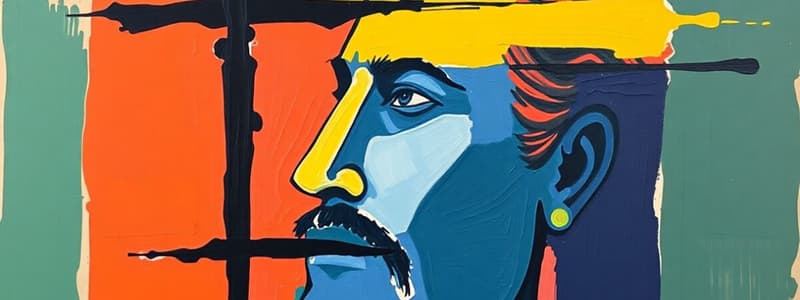Podcast
Questions and Answers
How did Burke differ from liberal thinkers like John Locke regarding the State of Nature?
How did Burke differ from liberal thinkers like John Locke regarding the State of Nature?
- He valued abstract reasoning over tradition.
- He considered the idea of returning to a State of Nature unrealistic. (correct)
- He believed in the rational discovery of principles.
- He thought humans could design a perfect society.
What aspect of human behavior does Burke argue is more likely to unite people?
What aspect of human behavior does Burke argue is more likely to unite people?
- Rational decision-making processes.
- Subjective artistic opinions. (correct)
- Objective political principles.
- An understanding of natural rights.
Which principle is central to Burke's conservative philosophy?
Which principle is central to Burke's conservative philosophy?
- The importance of abstract reasoning.
- The abolishment of tradition.
- The significance of long-standing traditions. (correct)
- The pursuit of radical change.
What did Burke mean by 'prejudice'?
What did Burke mean by 'prejudice'?
What does Burke caution against when discussing change in society?
What does Burke caution against when discussing change in society?
How does Burke view the role of traditions in providing societal stability?
How does Burke view the role of traditions in providing societal stability?
What does Burke imply about the reasoning capabilities of individuals compared to the collective wisdom of society?
What does Burke imply about the reasoning capabilities of individuals compared to the collective wisdom of society?
According to Burke, what is likely the consequence of revolutionaries introducing new principles?
According to Burke, what is likely the consequence of revolutionaries introducing new principles?
What is the underlying belief of Conservatives regarding longstanding customs?
What is the underlying belief of Conservatives regarding longstanding customs?
What attitude toward political change does Burke advocate?
What attitude toward political change does Burke advocate?
Study Notes
Burke's Critique of Enlightenment Thought
- Burke criticized Enlightenment thinkers like John Locke, who believed that humans could abandon existing societal structures, return to a "state of nature," and rationally establish a new society.
- Burke argued that this was unrealistic because humans lack the capacity for perfect rationality, leading to divergent interpretations of abstract principles and rights.
- Burke believed that human nature makes them prone to uniting emotionally around subjective matters like art, rather than objectively agreeing on political principles and rights.
- Burke emphasizes that human societies are better off embracing deeply rooted traditions and customs, passed down through generations.
The Conservative Value of Tradition
- Conservatives believe that long-standing institutions, customs, and habits should be valued because they reflect the accumulated wisdom of generations.
- They argue that even if traditional practices seem outdated by Enlightenment principles, their long-term existence suggests they suit human nature and societal needs.
- Burke cautioned against dismantling deeply entrenched societal systems, emphasizing the importance of respecting the wisdom of previous generations.
- Burke believed that "prejudice," understood as inherited wisdom, is often a valuable guide, preventing individuals from making hasty decisions based solely on abstract reasoning.
- Conservatives believe that relying on tradition provides a sense of stability and reassurance in a potentially chaotic world.
Studying That Suits You
Use AI to generate personalized quizzes and flashcards to suit your learning preferences.
Description
Explore Burke's arguments against Enlightenment ideals, particularly his critiques of rationality and the state of nature. This quiz delves into the conservative value of tradition and the importance of societal customs. Understand how Burke's perspective contrasts with Enlightenment thinkers like Locke.




